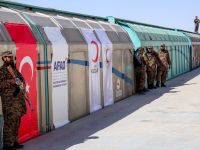A major Malaysian port is to make an initial public offering early next year in a partial privatization of its operations, it was announced Tuesday.
Bintulu in the eastern state of Sarawak has plans to become the world's largest liquefied natural gas (LNG) port operating from a single location, said Captain Awangku Malyx Pengiran Mahran, managing director of Bintulu Port Holdings Bhd (BPHB).
Malaysia is privatizing or part-privatizing almost all major ports in a drive to attract capital and improve efficiency.
Bintulu is currently 100 percent owned by the federal government.
BPHB, a company created for the stock market listing expected in February, will make a public issue of 100 million new shares in the port at an offer price of two ringgit (53 cents).
Another 136 million shares currently held by the finance ministry will be offered to national oil firm Petronas and to the Sarawak state government. The ministry will retain 164 million shares, officials said.
Nazir Razak, chief executive of Commerce International Merchant Bankers Bhd which is lead underwriter, said he expected the initial public offer to be well received.
"This port itself is an attractive investment proposition," Bernama news agency quoted him as saying at the signing of the underwriting agreement Tuesday.
Nazir said the port's future looks bright with the operations of two Petronas LNG plants, the expected completion of a third in 2002 and the development potential of its hinterland -- which includes the site for the giant Bakun dam.
"We envisage the port to be the single largest LNG terminal in the world from a single location," Awangku Malyx was quoted by Bernama as saying.
He said the port was also handling the entire cargo throughput for Shell's Middle Distillate Synthesis plant, which produces environmentally friendly fuel.
Last week Transport Minister Ling Liong Sik said the government would privatize the port of Kemaman in the northeastern state of Terengganu. He welcomed foreign investment in that exercise.
Penang port in the north is still wholly owned by the federal government but its operations have been corporatized -- KUALA LUMPUR (AFP)
.
© 2000 Al Bawaba (www.albawaba.com)







